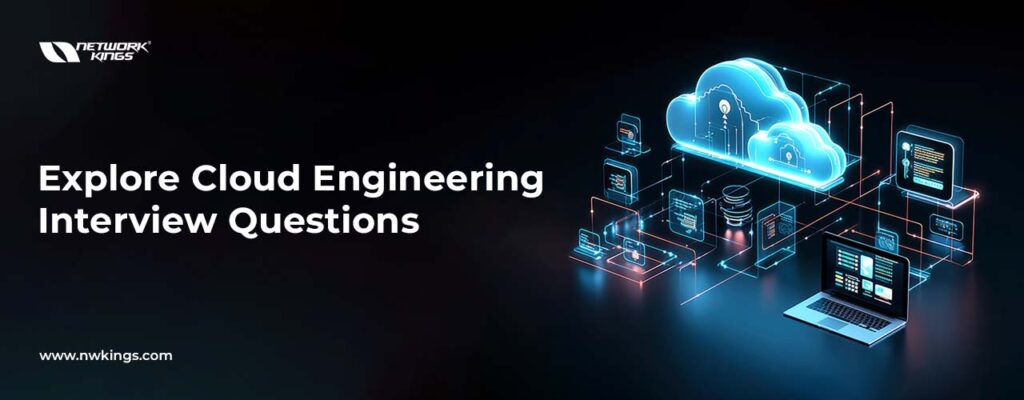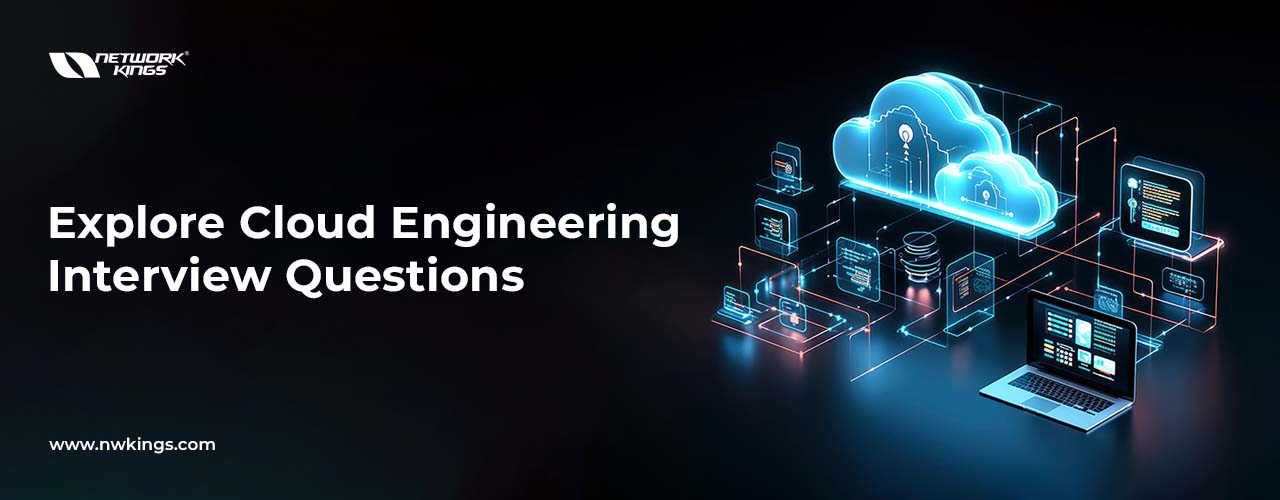
The demand for cloud engineers has skyrocketed in recent years as more and more companies are moving their infrastructure to the cloud. Whether you’re a fresh graduate looking to kickstart your career or an experienced professional looking for a new challenge, a cloud engineer interview can be a pivotal moment in your journey. In this blog post, we will explore a wide range of cloud engineer interview questions and answers. We will provide detailed answers to help you prepare and excel in your interview.
But before delving into the blog, let’s first know what a cloud engineer is.
What is Cloud Engineering?
Cloud engineering encircles the creation, handling, and supporting resources of computer infrastructure. With growing technology, the importance of Cloud engineering is attaining momentum. Cloud technology has allowed you to watch your favorite shows online and listen to songs with complete access. It utilizes engineering principles to create systems, and everybody wants to know how to be a cloud engineer.
Cloud engineers decrypt the computing problems of an entity or consumers. The services provided are software as a service (SaaS), platform as a service (PaaS), and infrastructure as a service (IaaS). As a cloud engineer, you will be in charge of storing, handling data, and moving with timely software updates. In totality, you will oversee the cloud system operating smoothly without any obstacles.
Cloud Engineer Interview Questions For Freshers?
Here are the top Cloud Engineer interview questions and answers for freshers’
- What is cloud computing?
Cloud computing refers to the delivery of computing services over the Internet. It allows users to access and utilize a wide range of resources such as servers, storage, databases, software, and networking without having to maintain them locally.
- What are the key benefits of cloud computing?
Scalability: Cloud computing offers the ability to scale resources up or down based on demand.
Cost-effectiveness: It eliminates the need for upfront infrastructure investments and reduces maintenance costs.
Flexibility: Cloud computing enables users to access resources from anywhere, at any time, using any device.
Reliability: Cloud service providers ensure high availability and data redundancy to minimize downtime.
Security: Cloud providers implement advanced security measures to protect data and prevent unauthorized access.
- How would you explain the difference between a public cloud and a private cloud?
A public cloud is a platform that is accessible to multiple organizations or individuals over the Internet. It is managed and maintained by a third-party service provider. On the other hand, a private cloud is dedicated to a single organization and is either physically located on-premises or hosted by a third-party provider. Private clouds offer greater control and security but may involve higher costs.
Junior Cloud Engineer Interview Questions
- What is a cloud service model?
Cloud service models include Infrastructure as a Service (IaaS), Platform as a Service (PaaS), and Software as a Service (SaaS). They define the level of control and responsibility the cloud provider and customer have over different aspects of the cloud infrastructure.
- Can you explain the concept of virtualization in cloud computing?
Virtualization in cloud computing refers to the creation of virtual instances of hardware, operating systems, storage, or networks. It enables multiple virtual machines or containers to run on a single physical server, maximizing resource utilization. Virtualization plays a crucial role in achieving scalability, isolation, and efficient resource management in cloud environments.
- Explain the difference between scalability and elasticity in cloud computing.
Scalability refers to the ability to increase or decrease resources based on demand. Elasticity specifically focuses on the automatic scaling of resources in real-time as demand fluctuates.
- What is a virtual machine in cloud computing?
A virtual machine (VM) is a software emulation of a physical computer. It allows multiple operating systems to run on a single physical machine.
- What is a container in cloud computing?
A container is a lightweight, portable unit that packages an application and its dependencies together. It ensures consistency and reliability when deploying software across different environments.
- What is AWS, and what are some of its core services?
AWS (Amazon Web Services) is a comprehensive cloud computing platform provided by Amazon. Core services include EC2 (Elastic Compute Cloud), S3 (Simple Storage Service), RDS (Relational Database Service), and more.
- Explain the difference between Amazon S3 and Amazon EBS.
Amazon S3 is an object storage service used for storing and retrieving data, while Amazon EBS provides block-level storage volumes that can be attached
- What is Google Cloud Platform (GCP), and what are its core offerings?
GCP is a suite of cloud computing services offered by Google. Core offerings include Compute Engine, App Engine, Cloud SQL, and Cloud Storage.
- How do you ensure data security in a cloud environment?
Data security in a cloud environment can be ensured through encryption, access control measures, regular security audits, and compliance with industry standards.
- What is IAM in AWS?
IAM (Identity and Access Management) is a service that allows you to manage users, groups, and roles in AWS, controlling their permissions to access AWS services and resources.
- What is a Virtual Private Cloud (VPC)?
A VPC is a virtual network dedicated to an AWS account. It allows resources to be launched into a virtual network, providing isolation and control over network configuration.
- Explain the concept of Load Balancing in the cloud.
Load Balancing evenly distributes incoming network traffic across multiple servers to ensure no single server is overwhelmed, improving the availability and reliability of applications.
Cloud Engineer Interview Questions and Answers for Experienced Professionals
- What is Infrastructure as Code (IaC)?
IaC is the practice of managing and provisioning infrastructure using code and automation, allowing for consistent and repeatable deployments.
- How do you ensure data security in a cloud environment?
Data security in a cloud environment can be ensured through encryption, access control measures, regular security audits, and compliance with industry standards.
- How do you handle sudden spikes in resource demand?
To handle sudden spikes in resource demand, it is essential to design your cloud infrastructure with scalability in mind. This can be achieved by:
- Utilizing auto-scaling features provided by cloud service providers.
- Implementing load balancers to distribute traffic across multiple instances or servers.
- Monitoring resource utilization and setting appropriate thresholds for scaling.
- Optimizing application code for performance and efficiency.
Senior Cloud Engineer Interview Questions
- What is a container orchestration platform, and name an example.**
A container orchestration platform manages the deployment, scaling, and operation of containerized applications. An example is Kubernetes.
- How does cloud computing facilitate DevOps practices?**
Cloud computing provides the infrastructure and tools needed to automate the deployment and scaling of applications, enabling faster and more efficient development and operations.
- What is AWS Lambda, and how does it work?
AWS Lambda is a serverless computing service that runs code in response to events. It allows you to execute code without the need to provision or manage servers.
- What is CloudWatch in AWS?
AWS CloudWatch is a monitoring service that provides real-time and historical data and actionable insights for AWS resources.
- How do you troubleshoot high CPU usage on an EC2 instance?
Troubleshooting high CPU usage may involve identifying resource-intensive processes, optimizing code, scaling resources, or utilizing auto-scaling groups.
- What is AWS Backup?
AWS Backup is a centralized, fully managed service that makes it easy to automate and manage backups of your AWS resources.
- Explain the concept of Multi-AZ deployment in AWS.
Multi-AZ (Availability Zone) deployment replicates resources in multiple physically separated locations to ensure high availability and fault tolerance.
- What are some strategies for cost optimization in the cloud?
Strategies include using reserved instances, leveraging auto-scaling, utilizing spot instances, optimizing storage, and setting up cost allocation tags.
- How does AWS help with compliance and governance?
AWS provides a wide range of compliance programs, security features, and tools to help customers meet industry-specific regulatory requirements.
- How do you communicate technical concepts to non-technical stakeholders?
Effective communication involves breaking down complex concepts into understandable terms, using analogies, and tailoring the message to the audience’s level of understanding.
Where can you prepare for the Cloud engineer interview?
You can prepare for a Cloud engineer interview by utilizing various resources such as online courses, tutorials, practice exams, and books. Network Kings is a reputable platform that offers cloud engineering training and preparation for Cloud engineer interviews. You can consider enrolling in their cloud computing courses to enhance your knowledge and skills in cloud technologies. They provide comprehensive cloud computing training materials, hands-on labs, and guidance from experienced instructors to help you prepare for your cloud engineer interview.
Conclusion
In conclusion, mastering the top cloud engineer interview questions is a crucial step toward securing a position in the dynamic and rapidly evolving field of cloud computing. We’ve covered a comprehensive range of topics, from fundamental cloud concepts to advanced deployment strategies, emphasizing the skills and knowledge needed to excel in interviews.
Remember, interview preparation is not just about memorizing answers, but about truly understanding the underlying principles. Take the time to practice hands-on exercises, dive into real-world scenarios, and explore cloud platforms to solidify your knowledge.
Additionally, soft skills such as effective communication, problem-solving, and collaboration are equally important. They showcase your ability to work in a team and communicate technical concepts to diverse stakeholders.
With dedication, practice, and a deep understanding of cloud engineering, you’ll be well-equipped to confidently tackle any interview and thrive in a rewarding career in cloud computing. Best of luck on your journey, and may you soar to new heights in the world of cloud engineering!


